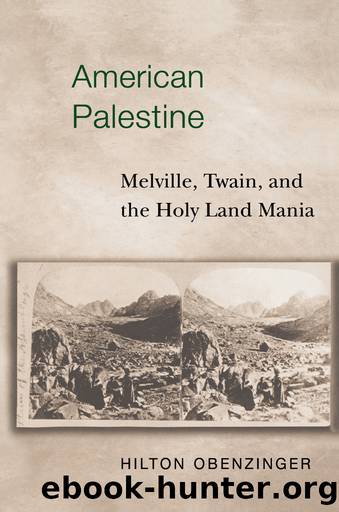American Palestine by Hilton Obenzinger

Author:Hilton Obenzinger
Language: eng
Format: epub
Publisher: Princeton University Press
Published: 2020-08-15T00:00:00+00:00
Columbus ended earth’s romance:
No New World to mankind remains!”
(4.21.155–59)
Ungar’s unraveling of the myth of America appeared in print the year that the centennial exposition in Philadelphia sought to reassert ideological coherence of the nation after the Civil War, erecting, in effect, a massive “fane” to the narrative of the New World as the inheritor and guarantor of “earth’s romance.” The 1876 centennial’s jumble of exhibitions was a hodgepodge of raw materials, inventions, and ethnological evidences that sought to link the Corliss steam engine, the Singer sewing machine, Charles Bierstadt’s stereograph photography of biblical scenes in Palestine, and thousands of other products of “divinely” ordered progress according to hierarchical models of scientific classification that cast Native Americans as savage impediments to civilization’s advance, rendered African Americans virtually invisible, and arranged the rest of the world along lines of Anglo-Saxon-Teutonic racial supremacy.24 Such a hodgepodge, which Melville described in a letter as “a sort of tremendous Vanity Fair,”25 displayed the very dynamics of scientific presumption, racial arrogance, religious trumpery, and bourgeois atomization that Ungar, the “Christian” of his Pilgrim’s Progress, rails against; indeed, the publication of Clarel that very same year highlights the way Melville’s poem-pilgrimage can be viewed as a counter-centennial.
But Ungar’s dark, Mennipean satire of America’s official carnival is not yet complete. He must plumb to the religious foundations of the national myth, underscoring just how much “earth’s romance” has ended with a final outburst on man’s “ever-bubbling wickedness” (4.22.17): not only can there be no “new” world, but there can be no renewal for mankind either. When the sea rover Rolfe remarks that “Tahiti should have been the place / For Christ in advent” (4.18.44–45)—the familiar comparison of the moist fecundity of the South Pacific to the stony aridity of Palestine Melville first recorded in his journal in 1857—Ungar defends the choice, that it was “God’s design . . . to broach / Rebuke of man’s factitious life” by coming to “Judaea, with customs hard as horn” (4.18.49–54). The stony landscape is, above all, the appropriate locale for challenging the hardness of the human heart, just as the overpowering immensity of the Pyramids is the appropriate site to inspire the ghastly idea of Jehovah. Through Rolfe’s suggestion and Ungar’s rejection Melville can finally erase the invisible tattoo he received in Typee, can reject the imprint of the Edenic alternative to civilization and reach back to his “adamant,” the deeper stain of human evil.
In “Of Wickedness the Word,” the canto following his denunciation of the New World, Ungar attempts to recover the true meaning of wickedness, “That Saxon term and Scriptural” (4.22.27) debased by “ridicule’s light sacrilege” (4.22.24). Earlier, in response to Derwent’s “plain sailing” toward democracy and happiness, Ungar denounces secular reform for involving methods “of the world,” when, in fact, “the world cannot save the world,” when even—in yet the ultimate flight from grace—“Christ renounces it” (4.20.33–35). Man’s wickedness is so profound that it gives “Credence to Calvin” (4.22.38), revealing its powerful hold on flesh in “that deep utterance decried / Which Christians labially confess,” the desire to “Be born anew” (4.
Download
This site does not store any files on its server. We only index and link to content provided by other sites. Please contact the content providers to delete copyright contents if any and email us, we'll remove relevant links or contents immediately.
| African | Asian |
| Australian & Oceanian | Canadian |
| Caribbean & Latin American | European |
| Jewish | Middle Eastern |
| Russian | United States |
4 3 2 1: A Novel by Paul Auster(11049)
The handmaid's tale by Margaret Atwood(6852)
Giovanni's Room by James Baldwin(5878)
Big Magic: Creative Living Beyond Fear by Elizabeth Gilbert(4723)
Asking the Right Questions: A Guide to Critical Thinking by M. Neil Browne & Stuart M. Keeley(4574)
On Writing A Memoir of the Craft by Stephen King(4213)
Ego Is the Enemy by Ryan Holiday(3991)
Ken Follett - World without end by Ken Follett(3972)
The Body: A Guide for Occupants by Bill Bryson(3801)
Bluets by Maggie Nelson(3710)
Adulting by Kelly Williams Brown(3670)
Guilty Pleasures by Laurell K Hamilton(3586)
Eat That Frog! by Brian Tracy(3514)
White Noise - A Novel by Don DeLillo(3435)
The Poetry of Pablo Neruda by Pablo Neruda(3367)
Alive: The Story of the Andes Survivors by Piers Paul Read(3310)
The Bookshop by Penelope Fitzgerald(3226)
The Book of Joy by Dalai Lama(3217)
Fingerprints of the Gods by Graham Hancock(3212)
